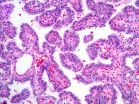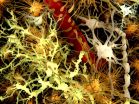(Press-News.org) In individuals living in the Arctic, researchers have discovered a genetic variant that arose thousands of years ago and most likely provided an evolutionary advantage for processing high-fat diets or for surviving in a cold environment; however, the variant also seems to increase the risk of hypoglycemia, or low blood sugar, and infant mortality in today's northern populations. The findings, published online October 23 in Cell Press's American Journal of Human Genetics, provide an example of how an initially beneficial genetic change could be detrimental to future generations.
"Our work describes a case where the same variant has likely been selectively advantageous in the past [but] disadvantageous under current environmental conditions," says senior author Dr. Toomas Kivisild, of the University of Cambridge, in the UK.
Dr. Kivisild and his colleagues analyzed the genomes of 25 individuals from Northern Siberia and compared their sequences with those from 25 people from Europe and 11 from East Asia. The team identified a variant that was unique to Northern Siberians and was located within CPT1A, a gene that encodes an enzyme involved in the digestion of long fatty acids, which are prevalent in meat-based diets. With agriculture being unsustainable in Arctic regions as a result of the extremely cold environment, coastal populations there have historically fed mostly on marine mammals.
When the investigators looked at the global distribution of the CPT1A variant, they found that it was present in 68% of individuals in the Northern Siberian population yet absent in other publicly available genomes. The variant has previously been linked to high infant mortality and hypoglycemia in Canadian Inuits, and its high frequency in these populations has been described as a paradox.
"The study's results illustrate the medical importance of having an evolutionary understanding of our past and suggest that evolutionary impacts on health might be more prevalent than currently appreciated," says lead author Dr. Florian Clemente, also of the University of Cambridge.
INFORMATION:
The American Journal of Human Genetics, Clemente et al.: "A selective sweep on a deleterious mutation in the CPT1A gene in Arctic populations."
Gene that once aided survival in the Arctic found to have negative impact on health today
2014-10-23
ELSE PRESS RELEASES FROM THIS DATE:
Genomic data support early contact between Easter Island and Americas
2014-10-23
People may have been making their way from Easter Island to the Americas well before the Dutch commander Jakob Roggeveen arrived with his ships in 1722, according to new genomic evidence showing that the Rapanui people living on that most isolated of islands had significant contact with Native American populations hundreds of years earlier. The findings reported in the Cell Press journal Current Biology on October 23 lend the first genetic support for such an early trans-Pacific route between Polynesia and the Americas, an impressive trek of more than 4,000 kilometers (nearly ...
Paper-based synthetic gene networks could enable rapid detection of ebola and other viruses
2014-10-23
Synthetic gene networks hold great potential for broad biotechnology and medical applications, but so far they have been limited to the lab. A study published by Cell Press October 23rd in the journal Cell reveals a new method for using engineered gene circuits beyond the lab, allowing researchers to safely activate the cell-free, paper-based system by simply adding water. The low-cost, easy-to-use platform could enable the rapid detection of different strains of deadly viruses such as Ebola.
"Our paper-based system could not only make tools currently only available ...
Thyroid cancer genome analysis finds markers of aggressive tumors
2014-10-23
ANN ARBOR, Mich. — A new comprehensive analysis of thyroid cancer from The Cancer Genome Atlas Research Network has identified markers of aggressive tumors, which could allow for better targeting of appropriate treatments to individual patients.
The finding suggests the potential to reclassify the disease based on genetic markers and moves thyroid cancer into a position to benefit more from precision medicine.
"This understanding of the genomic landscape of thyroid cancer will refine how it's classified and improve molecular diagnosis. This will help us separate ...
New TSRI studies bring scientists closer to combating dangerous unstable proteins
2014-10-23
LA JOLLA, CA – October 23, 2014 - Scientists at The Scripps Research Institute (TSRI) have discovered a way to decrease deadly protein deposits in the heart, kidney and other organs associated with a group of human diseases called the systemic amyloid diseases.
"If we can develop a strategy to reduce the load that's coming from these proteins, then we can open up treatment options that could be broadly applied to treat multiple systemic amyloid diseases," said Luke Wiseman, assistant professor at TSRI and a senior author of the new research.
In related studies ...
California's tobacco control efforts losing steam, finds UCSF report
2014-10-23
California's position as a leader in tobacco control is under threat, according to a new report from the UC San Francisco Center for Tobacco Control Research and Education. Once a highly successful program and international model, the state's anti-tobacco efforts now appear to be waning due to the decreased spending power of the California Tobacco Control Program, a resurgence of the tobacco industry in state politics, and the emergence of new unregulated tobacco products.
"The combination of weak leadership at the state level, willingness of political leaders to accept ...
YEATS protein potential therapeutic target for cancer
2014-10-23
Federal Express® and UPS® are no match for the human body when it comes to distribution. There exists in cancer biology an impressive packaging and delivery system that influences whether your body will develop cancer or not.
One area of interest focuses on histones, the chief component of chromatin, a cluster of large molecules. Aberrations in chromatin are thought to lead to DNA damage such as with cancer. Researchers at The University of Texas MD Anderson Cancer Center announced findings indicating a possible new way of manipulating chromatin and its histones ...
New insight on why people with Down syndrome invariably develop Alzheimer's disease
2014-10-23
La Jolla, Calif., October 23, 2014 –A new study by researchers at Sanford-Burnham Medical Research Institute reveals the process that leads to changes in the brains of individuals with Down syndrome—the same changes that cause dementia in Alzheimer's patients. The findings, published in Cell Reports, have important implications for the development of treatments that can prevent damage in neuronal connectivity and brain function in Down syndrome and other neurodevelopmental and neurodegenerative conditions, including Alzheimer's disease.
Down syndrome is characterized ...
Cancer exosome 'micro factories' aid in cancer progression
2014-10-23
Exosomes, tiny, virus-sized particles released by cancer cells, can bioengineer micro-RNA (miRNA) molecules resulting in tumor growth. They do so with the help of proteins, such as one named Dicer. New research from The University of Texas MD Anderson Cancer Center suggests Dicer may also serve as a biomarker for breast cancer and possibly open up new avenues for diagnosis and treatment. Results from the investigation were published in today's issue of Cancer Cell.
"Exosomes derived from cells and blood serum of patients with breast cancer, have been shown to initiate ...
TCGA study improves understanding of genetic drivers of thyroid cancer
2014-10-23
A comprehensive analysis of the genomes of nearly 500 papillary thyroid carcinomas (PTC) – the most common form of thyroid cancer – has provided new insights into the roles of frequently mutated cancer genes and other genomic alterations that drive disease development. The findings also may help improve diagnosis and treatment. Investigators with The Cancer Genome Atlas (TCGA) Research Network identified new molecular subtypes that will help clinicians determine which tumors are more aggressive and which are more likely to respond to certain treatments. Their ...
Helping sweet cherries survive the long haul
2014-10-23
SUMMERLAND, BRITISH COLUMBIA - A new study says that cherry producers need to understand new intricacies of the production-harvest-marketing continuum in order to successfully move sweet cherries from growers to end consumers. For example, the Canadian sweet cherry industry has had to modify logistics strategies--from shorter truck or air shipping to long-distance containerized shipping--to accommodate burgeoning export markets. Keeping cherries fresh and consumer-ready during long ocean crossings challenges producers to find new ways to retain fruit quality for weeks. ...





